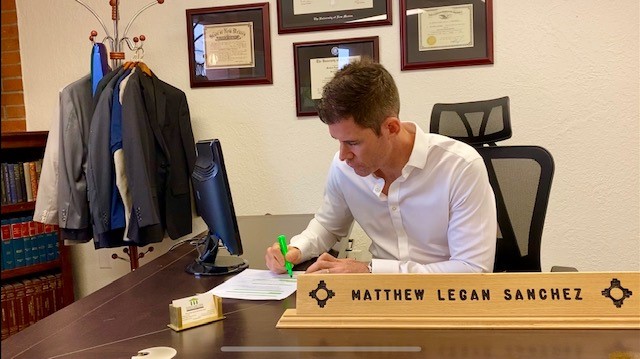
Violence during child custody disputes in Albuquerque
What is Violent Custody Disputes in Albuquerque New Mexico
Custody disputes generate intense emotions. At the extreme, these emotions can explode into domestic violence and other abusive acts. After the smoke has settled, these violent acts often trigger a number of legal consequences that can create a domino effect where a handful of courts and agencies intersect and collide.
Earlier this week an Albuquerque resident was arrested for shooting his ex-wife and her current husband during a routine exchange of the parties’ minor child.
The alleged shooting took place at the Target on Paseo Del Norte at around 8:30 P.M. The Father involved with the alleged event is currently in custody and facing felony charges for child abuse and aggravated assault.
According to the criminal complaint, the incident began with an argument surrounding “child care issues” ultimately escalating into a potentially fatal shooting.
For more information about the incident, click here: Custody dispute leads to shooting in Albuquerque parking lot.
Although the publicized shooting is an uncommon and extreme example, acts of abuse surrounding child custody disputes are common. The alleged shooting provides an excellent platform to discuss how acts of abuse often involve an array of courts and agencies. These courts and agencies, in turn, often intersect and can dramatically restrict one’s parental rights.
Violent Acts and Criminal Charges
Custody disputes that involve violence often result in criminal charges being filed. These charges run the gamut from misdemeanor counts of domestic violence, all the way up to first degree felony charges for child abuse or murder. When children are present, the charges generally include child abuse.
The Defendant/alleged offender is often prevented from having contact with the alleged victims as a mandatory condition of one’s release from jail. In the case above, the Defendant’s “Conditions of Release” restrict the Defendant from having any contact with the alleged victims (i.e. the mother, her spouse, and the minor child).
Often the underlying criminal charges crash into Civil Court (i.e. Family Court/Domestic Relations Division).
Violent Acts and Restraining Orders in Albuquerque, New Mexico
In situations where a violent act has taken place, the alleged victim has the ability to file a Petition for Order of Protection (i.e. Restraining Order), when the alleged act of abuse involves a “household member.” The term “house hold member” is broad and includes continuing relationships.
In order to receive a restraining order, a household member must file a Petition for Order of Protection. In Albuquerque, New Mexico this Petition is filed with Second Judicial District Court’s Domestic Violence Division. The Petition can be filed between the hours of 8:00 AM to 10:30 AM and 1:00 PM to 3:00 PM.
Provided that the Petition contains “probable cause” that an act of abuse occurred, a Temporary Restraining Order (“TRO”) is issued that prevents contact between the alleged abuser and the alleged victim(s). When children are involved, the TRO has the capacity to grant the alleged victim temporary, sole legal custody of the minor child(ren) at issue. This TRO temporarily overrides the parties’ Parenting Plan or court ordered visitation schedule, if any. The Domestic Violence Division sets a hearing, which by statute is required to be held within ten days. A Special Commissioner presides over the scheduled hearing. The Commissioner listens to testimony of the parties involved and considers evidence corroborating the alleged abuse. After considering the evidence, the Commissioner determines if it is more likely than not (i.e. if a preponderance of the evidence is present) that the facts stated in the Petition demonstrate that an act of abuse occurred.
Acts of abuse run the spectrum from physical harm, emotional abuse, suicide threats, harassment, or any other act that subjects the alleged victim(s) to an immediate threat of danger.
In the case discussed above, the Father charged with shooting his ex-wife will most assuredly have a TRO entered against him — provided that Mother files a Petition for Order of Protection on behalf of herself and the minor child. The TRO would prevent any contact between Father and his ex-wife and child. A hearing would be held within ten days. At this hearing, it is extremely likely that a “permanent” Order of Protection would be entered, given the extreme facts involved. Order of Protections are generally entered for a period of six months to one year. Because a child is involved, in the event that an Order of Protection is entered, the Commissioner would have temporary jurisdiction to enter an emergency parents visitation order that potentially remains in place for up to six months. The parental visitation outlined in the Order of Protection would temporarily override any previous visitation ordered in a corresponding “Domestic Relations Case” (i.e. Ongoing Family Court Case) that outlines child custody and parental visitation.
Violent Acts and Child Custody/Parental Visitation Orders
In addition to Restraining Orders, domestic violence and other acts of abuse often form the basis for changing one’s court ordered child custody and parental visitation arrangements, in the ongoing “Domestic Relations Case.”
Child Custody and parental visitation orders are entered in either divorce cases that involve children, or with unwed parents that have involved the Domestic Relations court in order to receive an enforceable court order that outlines the parties’ visitation and visitation schedule.
In Family Law the term “permanent” is illusory. In situations where parents have a court ordered, “permanent” visitation order, this “permanent” order is always modifiable based on a substantial change in circumstances. Abusive acts are generally considered to be the substantial change in circumstance necessary to modify the “permanent” visitation order in the Domestic Relations case (i.e the DR case). In the case above, an Order of Protection (i.e. Restraining Order) will almost certainly be issued in the Domestic Violence Division (i.e. DV case). The Order of Protection would override the current and “permanent” time-sharing order in the corresponding Domestic Relations case for up to six months. The Mother involved could also use the act of abuse as the basis to file a motion to modify the “permanent” custody order in the DR case.
Violent Acts and CYFD in New Mexico
Often, acts of abuse that involve children also involve New Mexico Children, Youth, and Families Department (CYFD). A CYFD investigation begins when allegations of abuse or neglect are reported to CYFD. The assigned case worker then performs an investigation to determine if the child is in danger, and if an act of abuse or neglect has taken place (i.e. whether the allegations are substantiated or unsubstantiated).
In situations where the child is in danger, a temporary “Safety Plan” can be entered that temporarily overrides court ordered time-sharing (i.e. the “permanent” DR order discussed above).
The CYFD caseworker is routinely subpoenaed to testify at Order of Protection hearings that involve children. The likelihood of an Order of Protection being entered is greatly increased when the CYFD caseworker testifies that an act of abuse took place, or that one parent poses a danger to the child.
The publicized shooting that took place earlier this week is an extreme example of how child custody disputes can erupt into domestic violence. Although the case is an extreme example, custody disputes and claims of violence and acts of abuse are very common. As outlined above, an isolated act of abuse can result in a domino effect where different courts (e.g. Criminal Court, Domestic Relations Division, and the Domestic Violence Division), as well as agencies (e.g. CYFD) intersect and collide, ultimately affecting one’s custody and parental visitation.
(505) SANCHEZ IS HERE TO ANSWER ANY QUESTIONS ABOUT WHAT IS VIOLENT CUSTODY DISPUTES IN ALBUQUERQUE, NEW MEXICO
Do you still have questions regarding what is violent custody disputes in Albuquerque, New Mexico? Custody cases often require the experienced hand and knowledge that comes with years of courtroom practice. Matthew Legan Sanchez has the experience needed to handle your unique case. Sanchez can be reached by calling (505) SANCHEZ.

Violent custody disputes in Albuquerque, New Mexico






